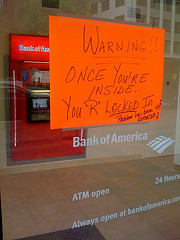Bank Of America Charges Customer $4,000 For Protection Plan, Won’t Show Evidence He Ever Signed Up

(e.wilder)
The L.A. Times’ David Lazarus has the story of a BofA customer who found out last year that he’d somehow become enrolled in a protection program that would allow him to skip credit card payments in the event of some catastrophic situation like the loss of his job. Thing is, this program came with a monthly cost of more than $200 to the customer.
“I’d never sign up for anything like this,” the man explains. “Never in a million years. I’m self-employed. I don’t sign up for anything that comes with extra fees.”
He says that back in 2010, he went through the process of changing his BofA credit card number because of what appeared to be a fraudulent charge on his account. At the time, he recalls being asked if he wanted to enroll in this program and telling the customer service rep he did not want it.
Then, more than a year later, he saw the $212 fee being charged to his account — and then noticed that he’d been charged that same fee going back to 2010 — for around $4,000 in total.
While he admits he should have paid closer attention to his statements, he also had no reason to think that BofA would be charging him for a plan he never enrolled in.
He contacted BofA and requested a refund. All the bank would agree to was a return of the previous six months’ fees — $1275 — which is better than nothing but not even half of what the Bank had taken from him.
The bank promised to look into the matter. It subsequently told the customer that its record showed he had indeed agreed to the program on Sept. 3, 2010. BofA also claimed it sent the customer a welcome package; he denies receiving anything.
He attempted once more to get his full refund. This time, he was told he enrolled on Sept. 6, 2010.
The bank told him it considered the matter settled at this point.
The customer did not.
He tried to get a refund one more time in September, demanding that BofA provide actual evidence of his agreement to sign up for this incredibly expensive program. The bank stuck to its guns and said it would no longer correspond with him on the matter.
Lazarus attempted to get something, anything from BofA to prove that the customer had signed up for this program.
“We’re not going to dwell on past practices,” a bank rep told him.
The bank says it has already discontinued this protection program “as part of a broader strategy to simplify our business.”
We think it might have to do with the hundreds of millions of dollars in enforcement actions against banks like Capital One and JPMorgan Chase for their bad practices in enrolling people into similar programs.
We’d like to call on lawmakers and regulators to either forbid banks from signing up customers to expensive add-on programs via the phone, or to require that any such phone calls be recorded and archived so that there is never a doubt about what terms were given over the phone.
Want more consumer news? Visit our parent organization, Consumer Reports, for the latest on scams, recalls, and other consumer issues.

